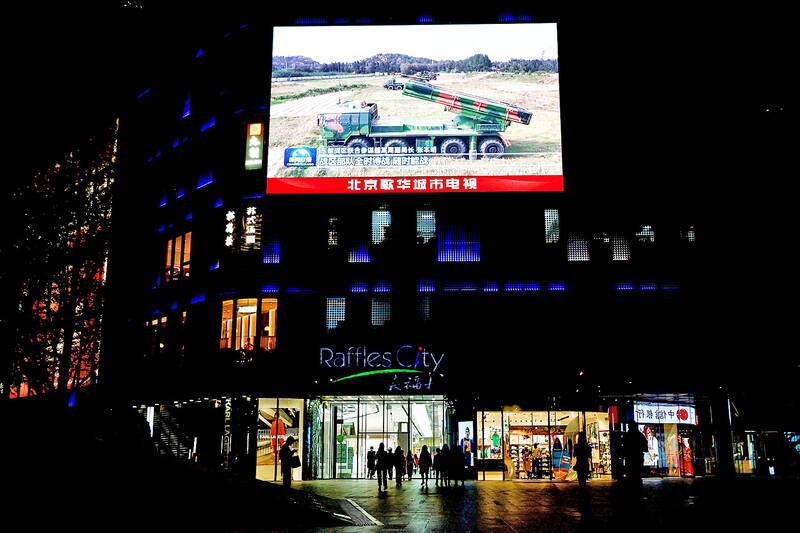Drawing lessons from the Ukraine crisis, a top Chinese general urged greater integration of novel capabilities, including artificial intelligence, with conventional warfare tactics ahead of any confrontation with the West.
A new genre of hybrid warfare has emerged from the Ukraine conflict, with the intertwining of “political warfare, financial warfare, technological warfare, cyberwarfare, and cognitive warfare,” General Wang Haijiang (汪海江), commander of the People’s Liberation Army’s (PLA) Western Theater Command, wrote in a front-page article in the official Study Times on Monday.
In the name of national security and to fend off perceived threats from the West, Chinese efforts to prepare the country for security challenges have not relaxed, despite a slowing economy and COVID-19. Defense spending is set to rise for the eighth straight year this year.

Photo: Reuters
The scale and sweep of Chinese military preparations are closely watched not just by the West, but also by China’s neighbors and Taiwan.
“At present and in the future, local conflicts and turmoil are frequent, global problems are intensifying, and the world has entered a new period of turmoil and change,” Wang wrote.
“Various ‘black swan’ and ‘gray rhinoceros’ events may occur at any time, especially with the containing, encircling, decoupling, suppressing, and military threats of some Western nations,” he said.
Despite the hundreds of billions of dollars poured into defense spending, China’s armed forces do not have much recent experience in a hot war, with its last — and brief — military conflict in 1979 with Vietnam.
The ability to win is needed to maintain national security, Wang wrote.
The PLA’s combat readiness in a hypothetical war has become a focus in the past few months as China flexes its military muscle over Taiwan, putting itself in potential conflict with the US.
Washington has a policy of “strategic ambiguity” over whether it would intervene militarily to defend Taiwan, but is bound by law to provide the nation with the means to defend itself.
China would seek new military advantages by building up capabilities in areas such as artificial intelligence, information networks, and aviation and space, Wang said.

ANGER: A video shared online showed residents in a neighborhood confronting the national security minister, attempting to drag her toward floodwaters Argentina’s port city of Bahia Blanca has been “destroyed” after being pummeled by a year’s worth of rain in a matter of hours, killing 13 and driving hundreds from their homes, authorities said on Saturday. Two young girls — reportedly aged four and one — were missing after possibly being swept away by floodwaters in the wake of Friday’s storm. The deluge left hospital rooms underwater, turned neighborhoods into islands and cut electricity to swaths of the city. Argentine Minister of National Security Patricia Bullrich said Bahia Blanca was “destroyed.” The death toll rose to 13 on Saturday, up from 10 on Friday, authorities

OPTIMISTIC: A Philippine Air Force spokeswoman said the military believed the crew were safe and were hopeful that they and the jet would be recovered A Philippine Air Force FA-50 jet and its two-person crew are missing after flying in support of ground forces fighting communist rebels in the southern Mindanao region, a military official said yesterday. Philippine Air Force spokeswoman Colonel Consuelo Castillo said the jet was flying “over land” on the way to its target area when it went missing during a “tactical night operation in support of our ground troops.” While she declined to provide mission specifics, Philippine Army spokesman Colonel Louie Dema-ala confirmed that the missing FA-50 was part of a squadron sent “to provide air support” to troops fighting communist rebels in

Two daughters of an Argentine mountaineer who died on an icy peak 40 years ago have retrieved his backpack from the spot — finding camera film inside that allowed them a glimpse of some of his final experiences. Guillermo Vieiro was 44 when he died in 1985 — as did his climbing partner — while descending Argentina’s Tupungato lava dome, one of the highest peaks in the Americas. Last year, his backpack was spotted on a slope by mountaineer Gabriela Cavallaro, who examined it and contacted Vieiro’s daughters Guadalupe, 40, and Azul, 44. Last month, the three set out with four other guides

Local officials from Russia’s ruling party have caused controversy by presenting mothers of soldiers killed in Ukraine with gifts of meat grinders, an appliance widely used to describe Russia’s brutal tactics on the front line. The United Russia party in the northern Murmansk region posted photographs on social media showing officials smiling as they visited bereaved mothers with gifts of flowers and boxed meat grinders for International Women’s Day on Saturday, which is widely celebrated in Russia. The post included a message thanking the “dear moms” for their “strength of spirit and the love you put into bringing up your sons.” It